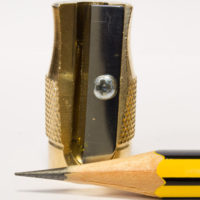After seeing my link on facebook about the effects of erasers on paper [1]Sorry, I didn’t find an English, only a Dutch and a German version of the paper. you must have guessed that the next post is about erasers, so today: a belated blog post about the Pental Ain Clic, an eraser in a pen shaped holder [2]Previously reviewed at East…West…Everywhere.. There are strong links to the recent Temagraph blog post: More or less the same eraser is also available under the Temagraph brand.
I don’t own the Temagraph version though, so my blog post is based on the Pentel Ain Clic version, which was sent to me by Fudepens.com, where it currently retails for €4 (~$5.50; £3.30). If you like their products: they do ship internationally and orders over €30 get free international shipping.
Shape
The main difference, compared to other erases that come in pen shaped holders, is that the eraser core is triangular. This means that you usually end up having a ‘corner’ of the eraser left when you need to erase small, tricky traces of graphite – a bit like Kokuyo erasers, just not that extreme. The problem with the round eraser sticks is not so much that the area you end up erasing is too big (the end of the stick ends up, more or less, in the shape of a half sphere. If you think of a ball lying on the ground, the contact area with the ground is very small), the problem is more that the point where you erase is difficult to control, because it is difficult to see where the eraser will make contact with the paper. This is where the triangular shape comes in handy, but the pointy corners you see in the picture will of course round off, too.
Materials
The body of the Ain Clic eraser is made in Mexico, while the eraser itself is produced in Japan and is composed of PVC and DINP. Just a warning, the P in DINP stands for phthalate, which you might have come across in the news. In the EU DINP is banned in toys and childcare articles that children can put into their mouths (see European Directive 2005/84/EC [3]http://ec.europa.eu/health/opinions/en/phthalates-school-supplies/glossary/def/dinp-di-isononyl-phthalate.htm ). This eraser doesn’t seem to be marketed at children, but I would keep in mind that it contains phthalates and would keep it away from children (or adults tempted to put it in their mouth). It might also be advisable to put the eraser crumbs in the waste bin ,instead of just blowing them off the paper, so they don’t end up on the desk or floor.
The Staedtler Mars plastic eraser stick 528 50, used in the comparison, did contain phthalates in the past (as shown in the paper about the effects of erasers on paper), but the current product specification sheet shows that the Mars plastic, which is also PVC based, is now phthalate free. I hope Pentel will change the Ain Clic in the future and will switch to a more ‘human friendly’ plasticiser.
Performance
The Ain Clic doesn’t only look good, performance-wise it’s also very good.
When just erasing with a single stroke (maybe more suitable for artists) performance is not too good, but when repeatedly moving the eraser across the graphite to be erased (which, I would think, is the standard way of doing it) performance is great. With repeated movement graphite doesn’t stick to much too the eraser and the eraser dust will roll up into strands – I like erasers where the dust rolls up like that.
Conclusion
Overall a great and good looking eraser, but the use of DINP is a black mark against it and the eraser shouldn’t be given to children.
I use pencils and erasers for writing, where I don’t need to eraser very fine details, but I can imagine this being an eraser very suitable for artists.
I would like to thank Fudepens.com for the Pentel Ain Clic, which I got sent for free. I don’t think the fact that I didn’t pay for the eraser influenced my opinion of this eraser in any way.
I would like to thank Pentel USA and Staedtler for the additional information they have provided about their erasers.
The photo of the Temagraph eraser is © Fila. I believe that the use of the photo shown in this blog post falls under “fair dealing” as described by the UK Copyright service.
I bought the Staedtler Mars plastic eraser stick at Granthams, a local art supply shop. I paid between £1 and £2 for it, but I can’t remember how much exactly.
Price (for the Pentel) and exchange rates: April 2014.
References
| ↑1 | Sorry, I didn’t find an English, only a Dutch and a German version of the paper. |
|---|---|
| ↑2 | Previously reviewed at East…West…Everywhere. |
| ↑3 | http://ec.europa.eu/health/opinions/en/phthalates-school-supplies/glossary/def/dinp-di-isononyl-phthalate.htm |
